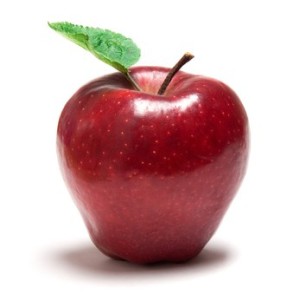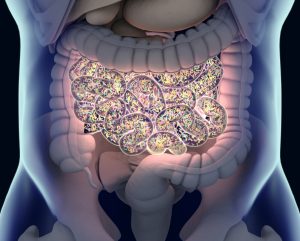Is It The Fructose Or Is It The Food?
Author: Dr. Stephen Chaney
 Fructose is the villain of the day. It is #1 on everyone’s “No-No” list. Almost every website, blog, and diet book demonize it. Even authors I highly respect say we should absolutely avoid it.
Fructose is the villain of the day. It is #1 on everyone’s “No-No” list. Almost every website, blog, and diet book demonize it. Even authors I highly respect say we should absolutely avoid it.
We are told it causes obesity, diabetes, heart disease, and non-alcoholic fatty liver disease – a disease that was unheard of only a few decades ago. We are told to read labels and avoid any foods with fructose or high-fructose corn syrup listed on their label.
But wait. Isn’t fructose a natural sugar? The answer is, “Yes”. It is the main sugar in fruit and many other naturally sweet whole foods. In fact, there is the same amount of fructose in an 8-ounce soda and a medium apple.
Does that mean that fruits are also bad for us? What is the truth?
Is It The Fructose Or Is It The Food?
 Let me put this into perspective for you. I have covered this in detail in a previous issue of Health Tips From The Professor. Here is a brief summary.
Let me put this into perspective for you. I have covered this in detail in a previous issue of Health Tips From The Professor. Here is a brief summary.
- There are no sugar villains. There are no sugar heroes. Most of your favorite “natural” sugars are chemically and biologically indistinguishable from high-fructose corn syrup. Other natural sugars, like agave sugar, contain more fructose than high-fructose corn syrup.
- All the studies showing the bad effects of fructose have been done with sodas and/or highly processed foods with added sugar. Let’s be clear. Those foods are bad for you.
- Fruits, on the other hand, are good for you. You’ve heard the old adage, “An apple a day keeps the doctor away”. A recent study showed that isn’t just an “old wives’ tale”. It is true.
Why is that? Why is fructose in sodas and junk foods bad for us and fructose in fruits good for us?
Part of the answer is that fruits are high in fiber, which slows the release of fructose into the intestine as fruits are digested. In addition, the fructose in fruits is trapped in a cellular matrix, which also slows the release of fructose during digestion.
Sodas and highly processed foods, on the other hand, have nothing to slow the release of fructose. It is immediately available as soon as the food reaches the intestine.
A recent study sheds light on why the rate of fructose release in our intestine may be important. The study showed:
- When fructose is released slowly our bodies know exactly what to do with it.
-
- Most of it is metabolized by the cells that line our intestine, and the rest is metabolized by the liver.
-
- In both cases fructose is converted to glucose and slowly released into the bloodstream.
-
- This stabilizes blood sugar levels.
- When fructose is released quickly our bodies are overwhelmed and bad things happen.
-
- The intestine passes the excess on to the liver, and the liver converts it to fat rather than glucose.
-
- The fat is stored in the liver.
-
- This leads to insulin resistance, diabetes, heart disease, and fatty liver disease.
But could the fiber in fruits have other beneficial effects such as supporting populations of beneficial gut bacteria? The study ( J Beisner et al, Nutrients, 12: 3444, 2020) I will focus on today suggests the answer is yes.
How Was The Study Done?
 Investigators from the University of Hohenheim, Germany recruited 12 healthy female volunteers, ages 20 – 40 (average age = 28).
Investigators from the University of Hohenheim, Germany recruited 12 healthy female volunteers, ages 20 – 40 (average age = 28).
Each of the subjects was given a series of diets to follow for one week each.
- Week one was a low fructose diet (10 g of fructose/day). For this diet phase subjects had to avoid sweets, highly processed foods, sodas, and fruits and vegetables containing more than 1 g of fructose per serving.
- Week two was a high fructose fruit diet (100 g of fructose/day). This diet phase emphasized fructose-rich fruits and vegetables. Sweets, highly processed foods, and sodas had to be avoided.
- Week three was a repeat of the low fructose diet (10 g of fructose/day).
- Week four was a high-fructose corn syrup diet (100 g of fructose/day). For this diet phase subjects had to sweeten the food they were eating with a measured amount of high-fructose corn syrup. They also had to avoid fructose-rich fruits and vegetables.
The diets were designed to have around 2,000 calories/day and to have the same amounts of fat (30% of calories), protein (15% of calories), and carbohydrate (55% of calories). However, the fiber content of the diets was very different (around 17 g/day on the low fructose and high-fructose corn syrup diets and around 38 g/day on the high fructose fruit diet).
The subjects were given detailed instructions and training before starting on the 4-week program. They also kept a daily dietary record of everything they ate and drank so the investigators would know how closely they stuck to their dietary instructions.
This experimental design was based on previous studies showing that populations of gut bacteria change within 24-48 hours when you go on a new diet. Stool samples were collected at the end of each week and analyzed for gut bacteria.
Is Fructose Good For You Or Bad For You?
- Consumption of a high-fructose, fruit-rich diet resulted in:
-
- An increase in beneficial butyrate-producing bacteria (more about that below).
-
- A decrease in bacteria associated with elevated total and LDL cholesterol.
-
- Decreased blood levels of total and LDL cholesterol.
- Consumption of a high-fructose corn syrup diet had the opposite effect. It resulted in:
-
- A decrease in beneficial butyrate-producing bacteria.
-
- An increase in bacteria associated with elevated total and LDL cholesterol.
-
- Increased blood levels of total and LDL cholesterol.
The authors concluded: “We provide evidence that the high-fructose corn syrup diet induces an imbalanced microbiota [gut bacteria] profile characterized by a significantly reduced abundance of beneficial butyrate-producing bacteria and of bacteria known for anti-obesity effects…Despite the high fructose content, the fruit-rich diet shifts the intestinal microbiota composition in a protective manner…”
The authors said that there were probably two mechanisms for the different effects of fructose in high-fructose corn syrup and in fruits.
- The fiber found in fruit supports the growth of beneficial bacteria in our intestine.
- When high-fructose corn syrup is present in foods with low fiber content, it is released rapidly in the intestine. As I noted above, the cells that line our intestine become overwhelmed and pass some of that excess fructose on to our liver. However, the authors cited previous studies showing that some of that excess fructose remains in our intestine and supports the growth of unhealthy bacteria.
What Does Butyrate Do?
 You are probably wondering what is special about butyrate-producing bacteria. Here is a brief synopsis.
You are probably wondering what is special about butyrate-producing bacteria. Here is a brief synopsis.
- Butyrate is a short chain fatty acid. As you might expect from its name, it was originally identified as a constituent of butter.
- Some species of gut bacteria convert the fats in our diet to butyrate.
- Butyrate has a number of beneficial effects (RB Canani et al, World Journal of Gastroenterology, 17: 1519-1528, 2012) in our bodies.
-
- It is used as a preferred energy source for the cells that line our intestine. Consequently, butyrate production in our intestines has been linked to:
-
-
- Reduced inflammation of the cells lining our intestine, which reduces the risk for diseases like inflammatory bowel disease (IBS) and Crohn’s Disease.
-
-
-
- Reduced risk of “leaky gut syndrome”.
-
-
-
- Reduced risk of colon cancer.
-
-
- It is also absorbed into the bloodstream and appears to affect several metabolic pathways. For example, butyrate production in the intestine is associated with:
-
-
- Decreased cholesterol levels.
-
-
-
- Improved blood sugar control.
-
-
-
- A healthy body weight.
-
What Does This Mean For You?
 This was a small study. As the authors noted, larger studies of longer duration are needed to confirm that the effects of fructose on our gut bacteria depend on the food the fructose is in. However, several other studies have come to similar conclusions.
This was a small study. As the authors noted, larger studies of longer duration are needed to confirm that the effects of fructose on our gut bacteria depend on the food the fructose is in. However, several other studies have come to similar conclusions.
More importantly, this study merely shows that the effect of fructose-containing foods on our gut bacteria is a potential mechanism for explaining why the effect of fructose depends on the food it is in.
There is already overwhelming evidence that fructose in fruits is good for us, while high-fructose corn syrup in sodas and highly processed foods is bad for us.
Does that mean high-fructose corn syrup is villainous? Should we read labels and avoid any food containing high-fructose corn syrup?
I would remind you that the amount of fructose and the relative abundance of fructose and glucose are virtually identical in fruits and high-fructose corn syrup. It is not high-fructose corn syrup that is the problem, it is the foods it is found in.
We don’t need to become compulsive label readers. We just need to eat more foods without labels.
The Bottom Line
High-fructose corn syrup has been vilified in recent years. However, there is increasing evidence that it is not fructose that is the problem. It is the foods it is found in.
A recent study was designed to test that hypothesis. The investigators fed subjects high fructose diets in which the fructose came either from fruits or high-fructose corn syrup. The amount of fructose was identical in the two diets. The investigators then asked what effect the two diets had on gut bacteria. In short:
- Consumption of the high-fruit diet increased healthy levels of beneficial gut bacteria and suppressed levels of unhealthy gut bacteria.
- Consumption of the high-fructose corn syrup diet had the opposite effect. It increased unhealthy bacteria and suppressed beneficial bacteria.
The authors concluded: “We provide evidence that the high-fructose corn syrup diet induces an imbalanced microbiota [gut bacteria] profile characterized by a significantly reduced abundance of beneficial…bacteria and of bacteria known for anti-obesity effects…Despite the high fructose content, the fruit-rich diet shifts the intestinal microbiota composition in a protective manner…”
My take is as follows: This study shows that the effect of fructose-containing foods on our gut bacteria is a potential mechanism for explaining why the effect of fructose depends on the food it is in.
There is already overwhelming evidence that fructose in fruits is good for us, and high-fructose corn syrup in sodas and highly processed foods is bad for us.
Does that mean that high-fructose corn syrup is villainous? Should we read labels and avoid any food containing high-fructose corn syrup?
I would remind you that the amount of fructose and the relative abundance of fructose and glucose is virtually identical in fruits and high-fructose corn syrup. It is not high-fructose corn syrup that is the problem, it is the foods it is found in.
We don’t need to become compulsive label readers. We just need to eat more foods without labels.
For more details read the article above.
These statements have not been evaluated by the Food and Drug Administration. This information is not intended to diagnose, treat, cure or prevent any disease.


